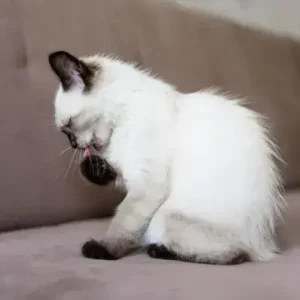Viral Respiratory Infections
Upper Respiratory Infections (URIs) like the Feline herpes virus a prevalent viral infections in cats, including sneezing, eye discharge, and nasal discharge.
Feline herpesvirus is a common cause of cat sneezing. It is a highly contagious virus that spreads through direct contact with infected cats or their secretions.
Other viral infections like feline calicivirus and influenza are additional viral culprits. The FVRCP combo vaccine provides protection against calicivirus.
Bacterial Infections
Bacterial infections usually follow respiratory viruses or other diseases. Abnormal colored discharge (yellow or green) from the nose or eyes is a common symptom of a bacterial infection. Common bacterial culprits include Bordetella, mycoplasma, and chlamydia. Antibiotics like doxycycline or azithromycin are effective in reducing sneezing.
Viral or bacterial infections are another common cause of cat sneezing and coughing. They usually follow respiratory viruses or other diseases.
Inflammation and Irritation
Chronic rhinitis is inflammation from various causes, including infections. Inflammation and irritation can also cause sneezing in cats.
Inflammation itself can trigger sneezing, creating a feedback loop. Treatment includes steroids, NSAIDs, and even immunotherapy in certain cases.
Foreign Material
Foreign objects can irritate nasal passages, and sneezing acts as a natural reflex to get the irritant out of the cat’s nose.
Blades of grass, foxtails, or dust can irritate nasal passages. Such things can be expelled by a simple sneeze however, larger objects may require diagnostic procedures like rhinoscopy or nasal flush.
Dental Disease
Dental issues affecting upper jaw teeth can lead to sneezing. Food entering the nose during eating triggers the sneeze reflex. Veterinary intervention is crucial to address dental problems.
Neoplasia (Tumors)
Neoplasia (tumors) inside nasal passages, more common in older cats, can cause sneezing.
Nasal tumors, detected through rhinoscopy or nasal biopsy, may lead to pain and discomfort, with a typically poor prognosis.
Fungal Infections
Cryptococcus is a less common but known cause of cat sneezing. It is a fungal infection that can affect the respiratory system, nervous system, and eyes.
Symptoms include sneezing, nasal discharge, and neurological signs like seizures. Treatment includes antifungal medication and supportive care.
Other Reasons
Several other factors, including polyps, abnormal formations, or reverse sneezing, may contribute to cat sneezing, though they are uncommon.
It is important to note that sneezing in cats can be a symptom of various underlying health issues. If your cat is sneezing frequently, it is best to consult a veterinarian for proper diagnosis and treatment.
When Should I Worry About My Cat Sneezing?
Cat sneezing is a common occurrence, often attributed to minor irritants or playful antics.
However, discerning when sneezing warrants concern is crucial for ensuring your cat’s health and addressing potential underlying issues.
Here are key indicators that may signal a need for cat sneezing treatment:
- Frequency and Duration
Pay attention to the frequency and duration of your cat’s sneezing. Occasional sneezing is generally normal, but if it becomes persistent or increases in frequency over time, it could indicate an underlying problem.
- Accompanying Symptoms
Monitor for additional symptoms accompanying sneezing, such as nasal discharge, watery eyes, lethargy, or changes in appetite. The presence of these signs may indicate an underlying respiratory issue that requires professional evaluation.
- Unusual Discharge
While clear nasal discharge may be normal during occasional sneezing, any change in color, particularly yellow or green, suggests a potential bacterial infection. In such cases, quick veterinary attention is advisable.
- Behavioral Changes
Notice any changes in your cat’s behavior. If sneezing is accompanied by lethargy, loss of appetite, or withdrawal from usual activities, it may signify an underlying health concern that warrants prompt investigation.
- Persistent Sneezing After Environmental Changes
If your cat continues to sneeze persistently after exposure to new environments, changes in the household, or encounters with potential allergens, it could indicate allergies or sensitivity that may require intervention.
- Blood in Sneezing
If you see your cat sneezing blood, it’s a red flag and should be addressed urgently. It may indicate trauma, a nasal injury, or other serious conditions that need immediate veterinary visit.
- Signs of Discomfort
Observe your cat for signs of discomfort during or after sneezing. Excessive pawing at the nose, head shaking, or any indication of pain should prompt a visit to the veterinarian.
- Chronic Sneezing
If you notice your cat sneezing a lot, it should not be taken lightly. A cat sneezing fit may lead to chronic rhinitis. Chronic conditions, whether due to infections or other factors, require a thorough veterinary examination for proper diagnosis and management.
How To Help My Cat Sneezing
Seeing your beloved cat sneezing can be concerning, but there are ways you can help comfort them during this time. Here are some home remedies for cat sneezing:
- Provide a Calm Environment: Create a quiet and peaceful space for your cat to rest. Reduce loud noises and disturbances to minimize stress, which can exacerbate sneezing.
- Use A Humidifier: Ensure the air in your home is neither too dry nor too humid. Using a humidifier can help keep nasal passages moist and alleviate irritation.
- Keep Your Cat Hydrated: Ensure your cat has access to fresh water at all times. Staying hydrated can help thin mucus and ease congestion.
- Cleanse the Environment: Regularly clean your cat’s living area to remove dust, allergens, and other potential irritants that could trigger sneezing.
- Provide Warmth: Keep your cat warm and cozy, especially during colder months. Provide comfortable bedding and consider placing a heated pad in their favorite resting spot.
- Monitor for Changes: Keep a close eye on your cat’s condition and behavior. If sneezing persists or worsens, or if additional symptoms develop, consult your veterinarian for further evaluation and guidance.
- Use Cat Sneezing Medicine: If recommended by your veterinarian, administer cat sneezing medicine as directed. Follow dosage instructions carefully and monitor your cat’s response. Consult your vet if you have any concerns or questions about medication usage.
- Offer Gentle Affection: Comfort your cat with gentle pets and cuddles, reassuring them that they are safe and loved. Your presence and affection can provide comfort during moments of discomfort.
Disclaimer: This blog provides general information on cat sneezing and related topics. It is not a substitute for professional veterinary advice. For specific concerns about your cat’s health, consult with a qualified veterinarian.



